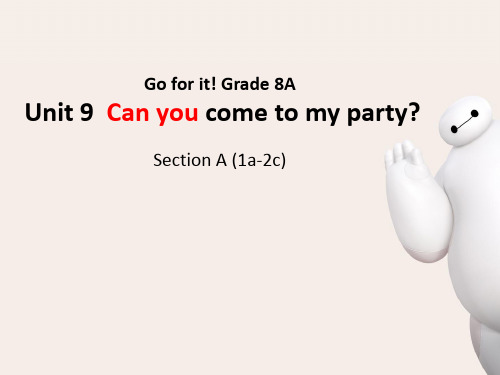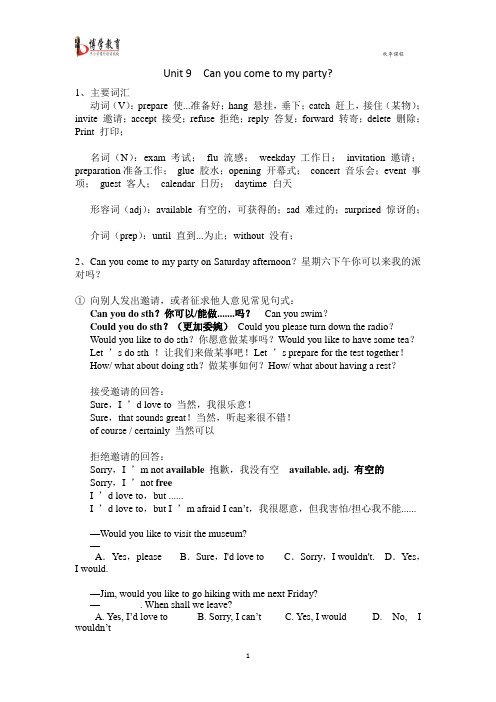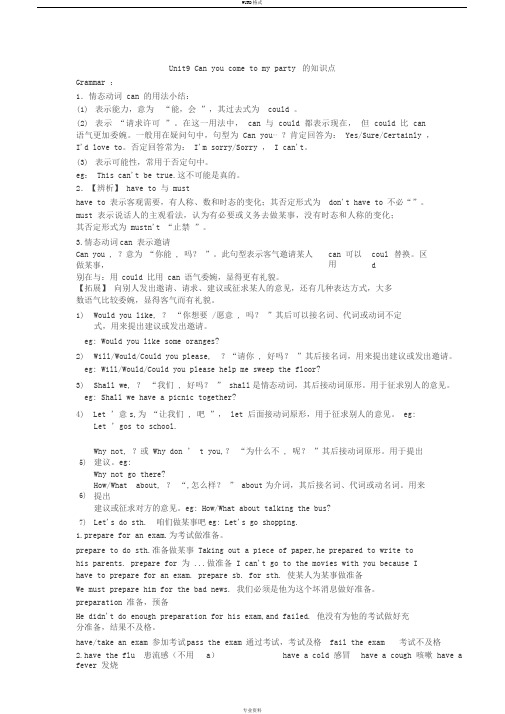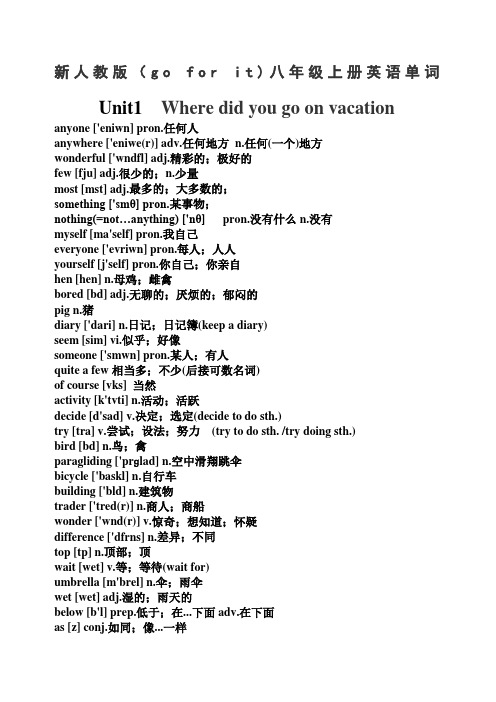人教Go for it! Unit 9 Can you come to my party最新
Can you come to my party 公开课一等奖课件

go to a movie
Part III
Unit 9 Can you come to my party?
Pair work: Invite your partner!
play computer games
Part III
Unit 9 Can you come to my party?
Pair work: Invite your partner!
2. Write an invitation card to invite more friends.
See you!
Part IV
Group work: Invite your friends!
Part V
Today, we know...
We should understand each other and speak in a friendly way, so we can keep friendship longer.
/prɪ'peə/
/ ɪg'zæm /
?
Part I
Unit 9 Can youLeabharlann come to my party?
Guess: Why can’t Pingping come?
She might have to...go to the doctor.
?
Because she has the flu.
play in the park
have meals in the KFC
go to the mountains
play badminton
Part IV Group work
Invite Your Friends !
人教版八年级英语上册unit 9知识点归纳

Unit 9 Can you come to my party?1、主要词汇动词(V):prepare 使...准备好;hang 悬挂,垂下;catch 赶上,接住(某物);invite 邀请;accept 接受;refuse 拒绝;reply 答复;forward 转寄;delete 删除;Print 打印;名词(N):exam考试;flu流感;weekday 工作日;invitation 邀请;preparation准备工作;glue 胶水;opening 开幕式;concert 音乐会;event 事项;guest 客人;calendar 日历;daytime 白天形容词(adj):available 有空的,可获得的;sad 难过的;surprised 惊讶的;介词(prep):until 直到...为止;without 没有;2、Can you come to my party on Saturday afternoon?星期六下午你可以来我的派对吗?①向别人发出邀请,或者征求他人意见常见句式:Can you do sth?你可以/能做.......吗?Can you swim?Could you do sth?(更加委婉)Could you please turn down the radio?Would you like to do sth?你愿意做某事吗?Would you like to have some tea?Let ’s do sth !让我们来做某事吧!Let ’s prepare for the test together!How/ what about doing sth?做某事如何?How/ what about having a rest?接受邀请的回答:Sure,I ’d love to 当然,我很乐意!Sure,that sounds great!当然,听起来很不错!of course / certainly 当然可以拒绝邀请的回答:Sorry,I ’m not available抱歉,我没有空available. adj. 有空的Sorry,I ’not freeI ’d love to,but ......I ’d love to,but I ’m afraid I can’t,我很愿意,但我害怕/担心我不能......—Would you like to visit the museum?—______A.Yes,please B.Sure,I'd love to C.Sorry,I wouldn't. D.Yes,I would.—Jim, would you like to go hiking with me next Friday?—________. When shall we leave?A. Yes, I’d love toB. Sorry, I can’tC. Yes, I wouldD. No, I wouldn’tTom______(can)come to my party because he is ill.②on Saturday afternoon在星期六下午在表示具体某天时,前面要用介词onOn weekend 在周末On Monday 在星期一On December 1st在12月1号On Wednesday morning/afternoon/evening 在周三早上/下午/晚上—My mother is ill.I have to look after her at home.—______.A.Thank you B.Oh,I don't know C.Bad luck D.I'm sorry to hear that3、prepare for an exam 为考试准备Prepare for... 为...而准备I can’t go with you because I have to prepare for the coming test我不能和你一起去,因为我必须得为即将到来的考试做准备Prepare sb for sth 使某人为某事做好了准备We must prepare ourselves for the meeting我们必须使我们自己为这次会议做好准备Prepare sth for sb 为某人准备好了某物Mom prepares a delicious meal for us 妈妈为我们准备了好吃的饭菜Prepare to do sth 准备做某事I prepare to take a trip in Taiwan 我准备去台湾旅游4、exam 是examination的缩写,意为“考试”Test ,也是“考试”的意思Take / have an exam 参加考试Pass the exam 通过考试/ 考试及格Fail the exam 考试不及格5、go to the doctor 去看医生6、Have the flu 患流感/感冒了Have的原意,“有”Have English class 上英语课Have breadfast 吃早餐Have a cold 感冒have a fever 发烧have a headache头痛Have a cough咳嗽have a sore throat喉咙痛have a toothache牙痛7、Sam isn’t leaving until next Wednesday 萨姆不会离开直到下周三为止萨姆下周三才会离开Until 直到......为止Not......until...... 不会做某事直到......为止直到......才......The noise didn’t stop until midnight 噪音直到午夜才停止She won’t forgive us until we say sorry to her 我们道歉前她是不会原谅我们的I waited until three o’clock 我们一直等到三点钟He lived with his parents until he got married 他结婚前一直和父母住在一起8、Can you hang out with us on Monday night?周一晚上你可以陪我们一起逛逛吗?Hang out with sb 和某人一起闲逛Hang out 闲逛/逛街He likes reading and he often hangs out in the bookstores他喜欢阅读所以经常在书店闲逛Hang,动词,“悬挂”,hang-hungHang the picture on the wall 把这幅画挂在墙上9、I’m afraid not 恐怕不能Afraid,形容词,意为“害怕的”否定时:I ’m afraid not 恐怕不能肯定时:I ’m afraid so 恐怕如此—Can you go to the concert?你能去听音乐会吗?—Sorry. I ’m afraid not 对不起,恐怕不能—Has she missed the bus?她错过公交了吗?—I ’m afraid so 恐怕如此/恐怕是这样没错10、invite,动词,意为“邀请”I nvite sb to sp,邀请某人到某地My pen pal invites me to his hometown 我笔友邀请我去他的家乡Invite sb to do sth,邀请某人做某事Mr.Kim invites us to have dinner with him 金先生邀请我们和他一起共用晚餐Invite(v)→invitation(n)邀请My best friend often invites me ______ delicious food.A.enjoy B.enjoying C.enjoyed D.to enjoy11、accept,动词,接受Accept的近义词是receive,但二者有所区别accept 与receive的区别:accept 意为“接受”指主观上原意接受receive 意为“收到”指客观上收到或拿到某样东西She accepted my apology她接受了我的道歉He received many letters from his family他收到很多来自家里的信件Receive letter from sb 收到某人的信I received his gift yesterday,but I wouldn’t like to accept it昨天我收到了他的礼物,但是我不想接受它12、refuse,动词,拒绝accept 的反义词Refuse sth 拒绝某物He rufused the invitation from Tony 他拒绝了Tony的邀请Refuse to do sth 拒绝做某事You should’t refuse to help her 你不应该拒绝帮助她13、the day before yesterday昨天(过去式)the day after tomorrow 后天(将来时)He went for Beijing the day before yesterday 他昨天去北京了Sarah will go for Beijing the day after tomorrow萨拉后天去北京—My father is coming back on Wednesday.—Oh, today is Monday, so you can see your father ______.A. todayB. the day before tomorrowC. tomorrowD. the day after tomorrow14、weekday 与weekendWeekday 工作日(周一至周五其中一天)Weekend周末(周六至周日)15、What ’s today?直译:今天是什么?引申:今天是什么日子?What ’s today?用来提问今天是几号、星期几。
人教版八年级上册第九单元知识点全八上unit9知识点

Unit9 Can you come to my party 的知识点Grammar :1.情态动词 can 的用法小结:(1)表示能力,意为“能,会”,其过去式为 could 。
(2)表示“请求许可”。
在这一用法中, can 与 could 都表示现在,但 could 比 can 语气更加委婉。
一般用在疑问句中,句型为 Can you⋯?肯定回答为: Yes/Sure/Certainly ,I'd love to。
否定回答常为: I'm sorry/Sorry , I can't。
(3)表示可能性,常用于否定句中。
eg: This can't be true.这不可能是真的。
2.【辨析】 have to 与 musthave to 表示客观需要,有人称、数和时态的变化;其否定形式为don't have to 不必“”。
must 表示说话人的主观看法,认为有必要或义务去做某事,没有时态和人称的变化;其否定形式为 mustn't “止禁”。
3.情态动词can 表示邀请Can you , ?意为“你能 , 吗?”。
此句型表示客气邀请某人做某事,别在与:用 could 比用 can 语气委婉,显得更有礼貌。
can 可以用could替换。
区【拓展】向别人发出邀请、请求、建议或征求某人的意见,还有几种表达方式,大多数语气比较委婉,显得客气而有礼貌。
1)Would you like, ?“你想要 /愿意 , 吗?”其后可以接名词、代词或动词不定式,用来提出建议或发出邀请。
eg: Would you like some oranges?2)Will/Would/Could you please, ?“请你 , 好吗?”其后接名词,用来提出建议或发出邀请。
eg: Will/Would/Could you please help me sweep the floor?3)Shall we, ?“我们 , 好吗?” shall是情态动词,其后接动词原形。
新人教版goforit八年级上册英语单词

新人教版(g o f o r i t)八年级上册英语单词Unit1 Where did you go on vacation anyone ['eniwn] pron.任何人anywhere ['eniwe(r)] adv.任何地方n.任何(一个)地方wonderful ['wndfl] adj.精彩的;极好的few [fju] adj.很少的;n.少量most [mst] adj.最多的;大多数的;something ['smθ] pron.某事物;nothing(=not…anything)['nθ] pron.没有什么n.没有myself [ma'self] pron.我自己everyone ['evriwn] pron.每人;人人yourself [j'self] pron.你自己;你亲自hen [hen] n.母鸡;雌禽bored [bd] adj.无聊的;厌烦的;郁闷的pig n.猪diary ['dari] n.日记;日记簿(keep a diary)seem [sim] vi.似乎;好像someone ['smwn] pron.某人;有人quite a few相当多;不少(后接可数名词)of course [vks] 当然activity [k'tvti] n.活动;活跃decide [d'sad] v.决定;选定(decide to do sth.)try [tra] v.尝试;设法;努力(try to do sth. /try doing sth.)bird [bd] n.鸟;禽paragliding ['prɡlad] n.空中滑翔跳伞bicycle ['baskl] n.自行车building ['bld] n.建筑物trader ['tred(r)] n.商人;商船wonder ['wnd(r)] v.惊奇;想知道;怀疑difference ['dfrns] n.差异;不同top [tp] n.顶部;顶wait [wet] v.等;等待(wait for)umbrella [m'brel] n.伞;雨伞wet [wet] adj.湿的;雨天的below [b'l] prep.低于;在...下面adv.在下面as [z] conj.如同;像...一样enough ['nf] adj.足够的adv.足够地;充分地duck [dk] n.鸭肉;鸭hungry(反full) ['hɡri] adj.饥饿的;渴望的feel like(doing sth.)想要dislike [ds'lak] v.不喜欢;厌恶n.不喜爱;厌恶;反感because of因为;由于have a good time=enjoy oneself=have fun(doing sth.)玩得痛快Unit2 How often do you exercise housework ['haswk] n.家务劳动hardly ['hɑdli] adv.几乎不;简直不;刚刚ever ['ev(r)] adv.曾经;在任何时候once [wns] adv.一次;曾经twice [twas] adv.两倍;两次Internet ['ntnet] n.因特网program ['prɡrm] n.节目;程序;课程;节目单full [fl] adj.满的;充满的;完全的swing [sw] n.摇摆;秋千v.摇摆;旋转maybe ['mebi] adv.或许;也许;可能swing dance摇摆舞least [list] adj.最小的;最少的at least至少hardly ever很少;几乎从不;难得junk n.垃圾;废旧杂物coffee ['kfi] n.咖啡;咖啡色health [helθ] n.健康;人的身体或精神状态result [r'zlt] .结果;后果percent [p'sent] adj.百分之...的online [n'lan] adj.在线的adv.在线地television ['telvn] n.电视机;电视节目although [l'e] conj.虽然;尽管;然而;可是through [θru] prep.穿过;凭借;一直到body ['bdi] n.身体mind [mand] .头脑;想法;意见;心思such [st] adj.这样的;如此的together [t'ɡee(r)] adv.共同;一起die [da] v.死;枯竭;消失writer ['rat(r)] n.作者;作家dentist ['dentst] n.牙科医生magazine ['mɡzin] n.杂志however [ha'ev(r)] adv.然而;无论如何;不管多么than [en] conj.比almost ['lmst] adv.几乎;差不多none [nn] pron.没有人;没有任何东西,毫无less [les] adj.更少的;较少的point [pnt] n.看法;要点;重点;小数点;目标;分数such as例如;诸如junk food n.垃圾食品;无营养食品more than超过;多于;不仅仅;非常less than不到;少于Unit3 I'm more outgoing than my sister. outgoing ['atɡ] adj.外向的better ['bet(r)] adj.更好的;较好的adv.更好地loudly ['ladli] adv.大声地;高声地;花俏地quietly ['kwatli] adv.安静地;悄悄地;平静地hard-working [hɑd'wk] adj.勤勉的;努力工作的competition [kmp'tn] n.竞争;比赛fantastic [fn'tstk] adj.极好的;了不起的which adj.哪一个;哪一些pron.哪一个;哪些clearly ['klli] adv.清楚地;显然地win [wn] v.赢;赢得;获胜;获得n.胜利though conj.虽然;尽管;adv.不过care about关心talented ['tlntd] adj.有才能的;有天赋的truly ['truli] adv.真实地;真诚地;正确地care [ke(r)] v.关心;担忧;照顾;在乎serious ['sris] adj.严肃的;严重的;庄重的mirror ['mr(r)] n.镜子;反映necessary ['nessri] adj.必要的;必然的both [bθ] adj.两者都pron.两者should [d] aux.应该;可能;应当;将要touch [tt] vt.触摸;感动reach [rit] v.到达;伸出;达成;取得联系;延伸;(伸手)去够heart [hɑt] n.心脏;内心fact [fkt] n.事实;真相;实际break [brek] v.打碎;折断;违背;解决;中断laugh [lɑf] v.发笑;笑;嘲笑n.笑声;笑;笑料similar ['sml(r)] adj.类似的share [e(r)] vt.分享,共享;分配;共有loud [lad] adj.大声的;adv.大声地;响亮地primary ['pramri] adj.最初的,最早的be different from和...不同information [nf'men] n.信息;情报;资料;通知as long as只要bring out拿出;推出the same as与...同样的in fact事实上;实际上;确切地说be similar to类似于;与...相似Unit4 What's the best movie theater theater ['θt] n.剧场;电影院;戏院comfortable ['kmftbl] adj.舒适的;充裕的seat [sit] n.座位;screen [skrin] n.屏幕;银幕close [kls] v.关;合拢;不开放;停业worst [wst] adj.最坏的;最差的cheaply ['tipli] adv.廉价地;粗俗地song [s] n.歌曲;歌唱choose [tuz] v.选择;决定carefully ['kefli] adv.小心地,认真地reporter [r'pt(r)] n.记者fresh [fre] adj.新鲜的;清新的comfortably ['kmftbli] adv.舒服地;容易地;充裕地worse [ws] adj.更坏的;更差的service ['svs] n.服务pretty ['prti] adv.相当地adj.漂亮的menu ['menju] n.菜单act [kt] v.行动;表演meal [mil] n.一餐;膳食so far到目前为止;迄今为止no problem没什么;不客气creative [kri'etv] adj.创造的,创造性的;performer [p'fm(r)] n.表演者;执行者talent ['tlnt] n.天赋;才能,才艺;common ['kmn] adj.常见的;共同的;普通的magician [m'dn] n.魔术师;术士beautifully ['bjutfli] adv.美丽地;完美地;role [rl] n.作用;角色winner ['wn(r)] n.获胜者prize [praz] n.奖品;奖金everybody ['evribdi] pron.每人;人人example [ɡ'zɑmpl] n.例子;榜样poor [p(r)] adj.可怜的;贫穷的seriously ['srisli] 严重地,严肃地give [ɡv] v.给;赠予;送crowded ['kradd] adj.拥挤的have…in common有相同特征all kinds of各种各样;各种类型be up to是…….的职责;由…….决定play a role发挥作用;有影响makeup编造for example例如take…seriously认真对待Unit5 Do you want to watch a game show sitcom ['stkm] n.情景喜剧(= situation comedy)news [njuz] n.新闻;消息soap [sp] n.肥皂;肥皂剧educational [edu'kenl] adj.教育的;有教育意义的plan [pln] n.计划;方法v.打算;计划hope [hp] .希望;期望;盼望n.希望discussion [d'skn] n.讨论;谈论stand [stnd] v.站立;忍受happen ['hpn] vi.发生;碰巧;出现;偶遇may [me] aux.可以,能够;可能,也许expect [k'spekt] v.预期;期待;盼望joke [dk] n.笑话;玩笑v.说笑话;开玩笑comedy ['kmdi] n.喜剧;滑稽;幽默事件find out查明、弄清meaningless ['minls] adj.无意义的;不重要的action ['kn] n.行为;活动cartoon [kɑ'tun] n.卡通;漫画culture ['klt(r)] n.栽培;文化;教养famous ['fems] adj.着名的;有名的appear ['p(r)] vi.出现;出版;显得become [b'km] v.变成;成为rich [rt] adj.富有的;富饶的;丰富的successful [sk'sesfl] adj.成功的;圆满的might [mat] aux.可能;也许;may的过去式main [men] adj.主要的;最重要的reason ['rizn] n.原因;理由film [flm] n.电影unlucky [n'lki] adj.倒霉的;不幸的;不吉利的lose [luz] vt.丢失;失败vi.失败ready ['redi] adj.准备好的;乐意的character ['krkt(r)] n.个性;品质;人物;simple ['smpl] adj.简单的;朴素的;单纯的;笨的army ['ɑmi] n.军队;陆军;一大批action movie动作片be ready to愿意迅速做某事dress up装扮;乔装打扮take sb.’s place代替;替换do a good job工作干得好;做得好Unit6 I'm going to study computer science. doctor ['dkt(r)] 医生engineer [end'nr] 工程师violinist [va'lnst] 小提琴手pilot ['palt] 飞行员pianist ['pnst] 钢琴家scientist ['santst] 科学家college ['kɑld] 大学education [edu'ken] 教育medicine ['medsn] 药,医学university [jun'vrsti] 大学,高等学府article ['ɑrtkl] 文章,论文send [send] 邮寄,发送grow up长大成长computer programmer计算机管理员be sure about确信make sure确保resolution [rez'lun] 决心,决定foreign ['frn] 外国的able [ebl] 能够discuss [dsks] 讨论,商量promise [prɑms] 承诺,诺言beginning [bɡn] 开头,开端improve [mpruv] 改进,改善physical ['fzkl] 身体的self-improvement [selfmp'ruvmnt] 自我改进,自我提高hobby ['hɑbi] 业余爱好own [on] 自己的,本人的,拥有personal ['prsnl] 个人的,私人的relationship [r'lenp] 关系write down写下have to do with关于;与……有关系take up学着做;开始做agree with同意be able to能够做某事Unit 7 Will people have robots paper ['pepr] 纸pollution [p'lun] 污染;污染物prediction [pr'dkn] 预测future ['fjutr] 未来pollute [p'lut] 污染environment [n'varnmnt] 环境planet ['plnt] 行星earth [rθ] n.地球;泥土plant [plnt] 种植,植物part [pɑrt] 参加,部分peace [pis] 和平sky [ska] 天空play apart参与astronaut ['strnt] 宇航员apartment ['pɑrtmnt] 公寓房间rocket ['rɑkt] 火箭;space [spes] .空间;太空even ['ivn] 甚至;愈加human ['hjumn] 人的;n.人;人类servant ['srvnt] 仆人dangerous ['dendrs] 危险的already [l'redi] 已经factory ['fktri] 工厂believe [b'liv] 相信disagree [ds'ɡri] 不同意shape [ep] 形状fall [fl] 倒塌;跌倒possible ['pɑsbl] 可能的probably ['prɑbbli] 大概;或许;很可能holiday ['hɑlde] 假日word [wrd] 单词;space station太空站over and over again多次;反复地hundreds of许多;大量;成百上千fall down突然倒下;跌倒;倒塌look for寻找;寻求Unit 8 How do you make a banana milk shake blender ['blendr] 搅拌器;果汁机peel [pil] vt.剥落;削皮pour [pr] pour [pr] 倒;倾倒yogurt ['joɡrt] 酸奶;honey ['hni] 蜂蜜watermelon ['wtrmeln] 西瓜spoon [spun] 勺,调羹add [d] 增加finally ['fanli] 最后,最终salt [slt] 盐sugar ['ɡr] 糖cheese [tiz] 干酪,奶酪popcorn ['pɑpkrn] 爆米花corn [krn] 玉米,谷物machine [m'in] 机器sandwich ['snwt] 三明治butter ['btr] 黄油,奶油turkey ['trki] 火鸡lettuce ['lets] 莴苣,生菜piece [pis] 件;篇;片;块;traditional [tr'dnl] 传统的traveler ['trvl] 旅行者England ['ɡlnd] 英格兰;英国celebrate ['selbret] 庆祝;庆贺pepper ['pepr] 胡椒粉;辣椒oven ['vn] 烤箱;烤炉cover ['kvr] 遮盖,盖子,gravy ['ɡrevi] 肉汁;肉汤serve [srv] 接待,服务temperature ['temprtr] 温度,气候Unit 9 Can you come to my party prepare [pr'per] v.预备;准备exam [ɡ'zm] 考试available ['velbl] 可得到的;有空的;hang [h] 悬挂;(使)低垂until [n'tl] 直到...的时候;直到…为止catch [kt] 赶上;抓住;捕捉invite [n'vat] 邀请accept [k'sept] 接受;refuse [r'fjuz] 拒绝invitation [nv'ten] 邀请;邀请函reply [r'pla] 回答,回复forward ['frwrd] 转交;发送,向前的delete [d'lit] 删除preparation [prep'ren] 准备,准备工作opening ['opn] 开幕式,落成典礼guest [ɡest] 客人concert ['kɑnsrt] 音乐会headmaster [hed'mstr] 校长event ['vent] 大事,公开活动calendar ['klndr] 日历,日程表Unit10 If you go to the party,you 'll have a great time! video ['vdio] 录像,录像带organize ['rɡnaz] 组织,筹备chocolate ['tɑklt] 巧克力upset [p'set] 难过,失望advice [d'vas] 劝告,建议travel ['trvl] 旅行agent ['ednt] 代理人,经纪人expert ['eksprt] 专家,能手teenager ['tined] 青少年normal ['nrml] 正常的unless [n'les] 除非,如果不certainly ['srtnli] 当然,肯定wallet ['wɑlt] 皮夹,钱包worried ['wrid] 担心的,烦恼的angry ['ɡri] 生气的,发怒的careless ['kerls] 粗心的,不小心的understanding [ndr'stnd] 善解人意的,体谅人的trust [trst] 相信,信任mistake [m'stek] 错误,失误careful ['kerfl] 小心的,细致的advise [d'vaz] v劝告,建议solve [sɑlv] 解决;解答experience [k'sprins] 信任,经历halfway [hf'we] 中途的adv.半路地else [els] 别的,其他的。
Unit9can-you-come-to-my-party知识点

的,可获得的”
up with sb 赶上某人
catch fire 着火
catch a cold 感冒
to do 拒绝做某事
没有。。。。(后面接名词,代词,动名词)可与 if 引导的否定状语从句进行
转换)
surprised to do sth 对做某事感到惊讶
be surprised at sth 对某事感到惊讶
19、look forward to 盼望;期待
20、the opening of… ……的开幕式/落成典礼
21、reply in writing 书面回复
22、go to the concert 去听音乐会
23、not…until
直到……才
24、meet my friend 会见我的朋友
25、visit grandparents 拜访祖父母
How 修饰 adj 6. I'm really busy this week. 这个星期我真的很忙。 be busy with+n 忙于某事 Betty is busy with her homework.
3
be busy +doing sth 忙于做某事 = Betty is busy______ (do) her homework. 7. class 与 lesson 区别: ① 在着重指“课时”时,可互换使用。
14、look after
照看;照顾
15、accept an invitation 接受邀请(accept 是主动而且高兴地接受;receive 表示
被动地“收到”,但不一定是接受,如收到信)
16、turn down an invitation 拒绝邀请
17、take a trip
人教版英语八年上册Unit9Can you come to my party SectionB含答案

Unit 9 Can you come to my partySection B一闯词汇关A.根据句意及首字母提示拼写单词。
1. Welcome to the o of our new supermarket!2. What a lazy cat! It always sleeps during the d .3. Look at the c , please. Tell me what the date today is.4. There will be many g at the party this weekend. We must prepare enough food for them.5. I would never forget this terrible e . It broke my common life.6. They will play pop music during the c , and that is my favorite thing.7. Many h from other schools will come to visit our school.8. I called you last night but there was no r .9. Uncle Li is leaving. Let's say g to him.10. My grandpa's death made me very s .11. I can't finish the work well w your help. I need you.12. D the two photos in your QQ zone, since they are terrible.13. Please f my mail to my new address.14. Can you p the article for me I can't see the handwriting clearly.15. We are planning a h party on Sunday night because of our new house.B.用所给词的适当形式完成句子。
Unit9Can-you-come-to-my-party知识点、语法点
Unit 9 Can you come to my party知识点一.重点词组1. on Saturday afternoon 在星期六下午2. have to 不得不3. prepare for 为……做打算4.go to the doctor 去看医生5. have the flu 患感冒6. help my parents 扶植我父母help my mom with housework 帮妈妈做家务7. come to the party 来(参与)聚会8. meet my friend 会见我的挚友9. go to the party 去聚会go to the movies 去看电影go to the concert 去听音乐会go to the baseball match /game 去(看)棒球赛10. too much homework 太多作业11. I'd love / like to. 我(很)乐意/情愿12. another time 下次,其它时间13. last fall 去年秋天14. hang out 常去某处;泡在某处15. after school 放学后16. on the weekend 在周末17. visit / see sb. 探望某人18. study for the chemistry test 为化学考试而学习19. the day after tomorrow 后天20. the day before yesterday 前天21. have a (piano) lesson 上钢琴课22. look after 照看;照看23. accept an invitation 接受邀请24. turn down an invitation 拒绝邀请25. Thanks for asking. 感谢(你的)邀请。
26. take a trip 去旅行27. at the end of this month 这个月末28. look forward to 渴望;期盼29. the opening of … ……的开幕式/落成典礼30. reply in writing 书面回复31. go shopping 去购物32. do homework 做家庭作业33. not … until 直到………才34. have fun/have a good time 玩得快乐点38. be free = have time 空闲的39. invite me to his birthday party 邀请我去他的生日聚会 invite sb. (to do sth)invite sb to a place[N] invitation40. help sb.(to)do sth.扶植某人做某事41. see sb. do sth. see sb.doing sth.42. be sad to do sth.做某事很哀痛43. invite sb. to do sth.邀请某人做某事44. the best way to do sth.做某事最好的方式45. have a surprise party for sb.为某人举办一个惊喜派对46. look forward to doing sth.期盼做某事47. reply to sth./sb.答复某事/某人二.重点句型1, Invitation(邀请):Can you come to my party Would you like to come to my partyDeclination(拒绝邀请): 1. I'm sorry, I can't. I have to/must … Sorry, I'd love to./I’m afraid not. /I’m not available. But I have to …Accepting(接受邀请):Yes, I’d like/love to.2. What day is it today / tomorrow / the day after tomorrow (询问星期)It is Wednesday.What is the date today / tomorrow / the day after tomorrow (询问日期)It is Nov. 2nd.What's / is today(询问日期和星期)It is Wednesday Nov. 2nd.What day was it yesterday / the day before yesterdayIt was Tuesday.What was the date yesterday / the day before yesterdayIt was Nov. 1st.What was yesterday / the day before yesterdayIt was Tuesday Nov. 1st.3. That's too bad. Maybe another time.4. Come and have fun.5. Thanks a lot for asking / inviting me.= Thank you very much for your invitation.6. Please keep quiet! I'm trying to study.7. I am free till 10:00 pm.三, 用法集萃1.时间状语前的介词的复习:星期, 详细日期, 详细某一天的早上, 下午, 晚上用on;年份, 月份, 季节,在早上, 下午, 晚上用in;详细时间点前用at.2.太多,too much,修饰不可数名词,too many, 修饰可数名词;much too, 太。
人教版英语八年级上册unit9 Can you come to my party(含答案)
八年级上unit9 Can you come to my party?(含答案)一.单项选择1.—It’s too late. I have to go now. —Oh, it’s raining outside. Don’t leave________it stops.A. sinceB. untilC. while2. —Dad, must we wait until the light becomes green?—Yes, I’m afraid we________. That’s the traffic rule.A. canB. mayC. have toD. Need3. —Can you give us more examples? —OK, I’ll give you_______example now.A. otherB. the otherC. anotherD. others4 My family has two dogs. One is white, _____is black.A.otherB. anotherC. the otherD. others5.—Jenny, can you come to my birthday party on Sunday? —Sure, _______.A.I’d loveB. I can’tC. I’d love toD. I have to6.—Why are you so tired these days? —Well, I have_____work to do.A.too muchB. too manyC. much tooD. so many7.John didn’t go to bed______the football match on TV was over last night, so he was sleepy now.A.becauseB.untilC. ifD. but8.—Can you go shopping with me this afternoon, Linda?—_____. I must study for my English test.A.I hope soB. I’m afraid notC. SureD. I’d love to9.—Would you please see the film Iron Man3 with me tonight, Kate?—I’d love to, but I’ve_______Linda’s invitation to dinner.A.sufferedB. earnedC. receivedD. accepted10.H e may refuse______such a silly question.A.answerB. answeredC. answeringD. to answer11.T he speech contest will start_____2: 00pm______Friday afternoon.A. at; inB. at; onC. in; onD. at; at12. —What are you going to do this evening?—I’m not sure. I_____watch TV at home.A. mustB. have toC. mightD. should13. —______are you going to the mountains with on Sunday, Tom? —My friends.A. WhenB. WhatC. WhereD. Who14. —Jim,_______you go and play basketball with us now?—Sorry, I can’t. I have to clean my room at home.A. AreB. CanC. MustD. Do15. We have to_______ourselves when we are away from home.A. look atB. look forC. look upD. look after16. —I’m looking forward to_______my parents soon. What about you?—Me too.A. seeingB. seeC. sawD. to see17. I couldn’t do it________your great help. Thanks a lot!A. withB. withoutC. forD. to18 .One important aim of our school is to prepare us for the future_____ we can face all theA.so farB. so thatC. even ifD. if only19. Alice kept_______all day because she lost her favourite toy.A.gladB. sadC. surprisedD. tired20.We all know that fish can’t live_______water.A.withB. afterC. byD. without21.Jonson is looking forward to________the Great Wall next year.A.visitedB. visitC. visitsD. visiting22.The girl saved every coin_______she could buy her father a present on Father’s Day.A. ifB. in order toC. so thatD. because23. _______wonderful concert they are putting on in the movie theater!A. HowB. WhatC. What aD. What an24. I’ll invite all my friends_______my birthday party.A. withB. atC. inD. to25. The football match______on the evening of next Saturday in the city gym.A. wasB. willC. will beD. be26. —_______go for a picnic this weekend. —Good idea.A. Can youB. What aboutC. When do youD. Let’s27. The final exam is coming. I________try my best to study for it.A. mustB. mightC. needD. would28. The students are very ______ at the ______ news.A. surprised;surprisingB. surprising;surprisedC. surprised;surprisedD. surprising;surprising29. She spends ______ time (in) watching TV. It is bad for her eyes.A. much tooB. too manyC. too muchD. many too30. —Must I be home before nine o'clock, Mom?— No, you ________. But you have to come back before ten o'clock.A.needn't B.can't C.mustn't D. shouldn’t二.用所给词的适当形式填空1.Julia_______(have) to help her mother do the housework on weekends.2.Thanks a lot for_______(show) me around your school.3. —Are you free_______(hang) out with me this afternoon?—No, I’m not free. I might visit my grandparents.4.—Hi, Tim. When______you_______(finish) your homework? —About in half an hour.5. We’re______(plan) to play basketball after school.6. I’m glad that Vincent accepted the______(invite).7. All of us are making________(prepare) for the end-of-year party.8. I'm very sorry ______(hear)that you are ill.9. My cousin is looking forward to________(find) a good job soon.10. Ms. Yang went out of the room without__________(say) anything.11. Thanks for your ______ (prepare) for the party.12. I would love ______(make)friends with new students.13. —Can he go to the baseball game?—No,he can't.He has to ______(study)for a test.14. We ______(catch) some fish last Friday.三.先选词并用其适当形式填空A.catch, exam, flu, prepare, available1.The final_______is coming. All the students are working hard for it.2.Linda has to go to the doctor this afternoon because she has the________.3. Walk ahead, please. I’ll________you up soon.4. —Can you come over to my house this weekend? —Sorry, I’m not_______. I have to help my parents.5. —What are you busy doing now? —Well, I’m busy_______for the English party.B.weekday, what, look after, have, study1.We usually go to work on________and have a rest on weekends.2.He can’t play soccer with us this afternoon. He________a piano lesson.3.I can’t go shopping with you, Julie. I have to______for my Englis h exam.4.Julie’s mother is ill. She must________her in the hospital.5. —_______is today? —It’s Tuesday the12th.C. concert, guest, daytime, open, event1.I would like to invite you to the______of our new school.2.Nancy enjoys music. I bought her a ticket to the_______on her birthday.3.The hotel now opens to the____.4.People work in the______and sleep at night.5. The band usually plays for school______, such as School Day, School Music Festival and so on.四.按要求改写句子1. It’s twelve o’clock?(对画线部分提问)_____ ______ is it?2.I got a letter from my pen pal in Australia last night.(改为同义句)I ______ ________ my pen pal in Australia last night3.The meeting starts 10:00.(对画线部分提问)______ ______the party______?4.She has to go to see the doctor.(改为否定句)She ______ __________ to go to see the doctor.5.People in that town have to move to a new place.(改为一般疑问句)______ people in that town ______ ______ move to a new place?八年级上unit9 Can you come to my party?一.单项选择1-5.BCCCC 6-10.ABBDD 11-15.BCDBD 16-20.ABBBD21-25.DCCDC 26-30.DAACA二.用所给词的适当形式填空1.has2.showing3.to buy4.will finish5.planning6.invitation7.preparations8.to hear9.finding 10.saying 11.preparation12.to make 13.study 14.caught三.先选词并用其适当形式填空A. 1.exam 2.flu 3.catch 4.available 5.preparingB. 1.weekdays 2.has 3.study 4.look after 5.WhatC. 1.opening 2.concert 3.guests 4.daytime 5.events四.按要求改写句子1.What time2.heard,from3.When,does,start4.doesn’t,have5.Do,have,to。
新人教版八年级上册英语Unit9教案
课时教案课题:Unit 9 Can you come to my party? Section A 1 (1a-2d)第课时总序第个教案课型:编写时间:年月日执行时间:年月日教学目标:1. 语言知识目标:1) 能掌握以下单词:prepare, prepare, prepare prepare prepare for, for, for, exam, exam, exam, flu, flu, flu, available, available, available, another another time, until, hang, hang out, catch 2) 能掌握以下句型:①—Can you come to my party on Saturday afternoon? —Sure, I’d love to. ②—Can you go to the movies on Saturday? —I ’m m sorry, sorry, sorry, I I ’m m not not not available. available. available. I I I have have have too too too much much much homework homework homework this this weekend. ③That That’’s too bad. Maybe another time. ④Sure. Thanks for asking. ⑤Sam isn ’t leaving until next Wednesday. 2) 能了解以下语法:用情态动词can 来表达邀请。
3)学会表达邀请,学会对邀请进行恰当的答复或拒绝。
2. 情感态度价值观目标:学会人际交往的基本常识,学会人际交往的基本常识,学会有礼貌地邀请别人以及回答别人的学会有礼貌地邀请别人以及回答别人的邀请的方式。
人教版八年级英语上册《Unit 9 Section A》作业同步练习题及参考答案
Unit9Can you come to my party?Section A(1a-1c)Ⅰ.单项选择1.Bill go out to play because he help his dad in the garden.A.can;have toB.can;has toC.can’t;have toD.can’t;has to2.—Can you go to the concert with me this afternoon?—Yes,.A.I’d likeB.I’d love toC.I would loveD.Yes,I do3.I’m sorry I have to for the English test.A.studyB.studiesC.studyingD.to study4.—Can you come to my party on Sunday?—,I can’t.I have to go to the doctor.A.YesB.SureC.SorryD.Not5.—Why not join us in the game,Jack?—,but I have to do my homework.A.Yes,pleaseB.I’d love toC.Let’s goD.I don’t like itⅡ.根据图片提示完成对话,每空一词1.—Can you help me clean the window,Gina?—Yes,,Mum.2.—Can you come to my party,Linda?—,.I have a piano lesson.★Ⅲ.根据课本P65的主题图,用英语写一写这些孩子能否去参加星期六下午的聚会,不能的写清理由。
参考答案Ⅰ.单项选择1.D2.B3.A4.C5.BⅡ.根据图片提示完成对话,每空一词1.I’d love to2.Sorry;I can’t★Ⅲ.根据课本P65的主题图,用英语写一写这些孩子能否去参加星期六下午的聚会,不能的写清理由。
- 1、下载文档前请自行甄别文档内容的完整性,平台不提供额外的编辑、内容补充、找答案等附加服务。
- 2、"仅部分预览"的文档,不可在线预览部分如存在完整性等问题,可反馈申请退款(可完整预览的文档不适用该条件!)。
- 3、如文档侵犯您的权益,请联系客服反馈,我们会尽快为您处理(人工客服工作时间:9:00-18:30)。
Unit 9 Can you come to my party?Section A 1 (1a-2d)一、教学目标:1. 语言知识目标:1) 能掌握以下单词:prepare, prepare for, exam, flu, available, another time, until, hang, hang out, catch2) 能掌握以下句型:①—Can you come to my party on Saturday afternoon?—Sure, I’d love to.②—Can you go to the movies on Saturday?—I’m sorry, I’m not available. I have too much homework this weekend.③That’s too bad. Maybe another time.④Sure. Thanks for asking.⑤Sam isn’t leaving until next Wednesday.2) 能了解以下语法:用情态动词can来表达邀请。
3)学会表达邀请,学会对邀请进行恰当的答复或拒绝。
2. 情感态度价值观目标:学会人际交往的基本常识,学会有礼貌地邀请别人以及回答别人的邀请的方式。
理解“义务”涵义,学会承担自己应尽的义务,能够在班级以及社会生活中担当一定的责任。
理解人与人之间的真情,学会珍惜朋友之间、师生之间的友情。
二、教学重难点1. 教学重点:1) 运用所学提出邀请,接受邀请和拒绝邀请。
2) 正确使用can, might, must 等情态动词。
2. 教学难点:1) 扎实掌握重点词汇和表示邀请的句型并能灵活运用。
2) 通过听力练习和小组合作,理解并能提出邀请并作肯定回答。
三、教学过程Ⅰ. Lead-in1. 在大屏幕上向学生展示一张邀请函。
T: Hello, everyone! Yesterday I received an invitation letter from my dear friend; she invited me to go to her Halloween party. But I hav e something important to do. I’m studying for a test. I don’t know what to do. What should I say? Can you help me? …2. Ss try to answer the questions.Ⅱ. Presentation1. 引导学生们看大屏幕上邀请及两个答语。
Look at the expressions on the screen: “Sure, I’d love to.” “I’m sorry, I have to…”. Read the expressions to the class and the students repeat each one.Say, can you come to my party? Have the S1 give “yes answers” and S2 give “no answers” then plus a reason. Ask students to give their own reasons. If necessary, I can give a reason and have the students repeat it.2. 用汉语向学生说明回答别人邀请时,所作的两种类型的答复。
Ⅲ. Game1. 学生看大屏幕上的转盘,根据转盘所停止位置的词组来做邀请与应答的游戏。
2. Make a model to the Ss:e.g. S1: Can you go shopping with me?S2: Sorry, I can’t. I have to prepare for the math exam.…3. Ss work in pairs and answer the questions.Ⅳ. Listening1. T: Now listen to the recording and write the names next to the correct students in the picture.2. Play the recording for the first time. Students only listen. Play the recording a second time. Write the name of each person next to his or her picture.3. Play the recording again. Check the answers with the Ss.Ⅴ. Group work1. Help students form groups of four. Say, one of you is student A. Student A invites the other three students to your party. The other students say “yes” or “no”. Remember to give a reason.2. Have the students work in groups.3. Let some groups ask and answer about their conversations.Ⅵ. ListeningWork on 2a:1. Read the sentences in 2a. Tell Ss they will listen to some sentences. They should listen and circle the words “can” or “can’t” in the bracket.2. Play the recording for the Ss to listen and circle the words.3. Play the recording again to check the answers.Work on 2b:1. Let Ss read the chart below. Tell Ss, this time they must write the reasons in the chart. Make sure they know what to do.2. Play the recording for the Ss to write the reasons in the chart.3. Play the recording again to check the answers.Ⅶ. Pair work1. Tell Ss to look at the reasons in the chart in 2b. Then write some more.2. Let Ss read conversations in 2c.3. Ss practice the conversations using the reasons in the chart on the right.4. Ask some pairs to act out their conversations.Ⅷ. Role-play1. Read the conversations and answer the questions:1) What did they do last fall? _____________________________________2) What does Nick have to do on Saturday? _____________________________3) When will they hang out? _____________________________2. Explain some new words and main points in the conversation.until, not…until, hang out, catch3. Read the conversation after the teacher.4. Practice the conversation with their partner. Then let some pairs act out the conversation. Homework:1. Recite the conversation in 2d after school.2. 假设你将于这个周末过生日,并开一个生日聚会,你约请朋友们参加你的聚会,但有几名同学因故不能来,请你将与他们的对话用英语编写出来。
板书设计:Section A 2 (Grammar Focus-3c)一、教学目标:1. 语言知识目标:1) 学习掌握下列词汇:invite, accept, refuse2)进行一步复习巩固运用Section A 部分所学的生词和词组。
3)进一步学习运用所学的知识来表达邀请;学会如何回答别人对自己的邀请,以及学会如何有礼貌地拒绝他人的邀请,并陈述理由。
4) 掌握情态动词can, must, have to, might的用法。
2. 情感态度价值观目标:学会人际交往的基本常识,学会有礼貌地邀请别人以及回答别人的邀请的方式。
理解“义务”涵义,学会承担自己应尽的义务,能够在班级以及社会生活中担当一定的责任。
理解人与人之间的真情,学会珍惜朋友之间、师生之间的友情。
二、教学重难点1. 教学重点:1) 进一步学习运用所学的知识来表达邀请;学会有礼貌地答复他人对自己的邀请。
2) 掌握情态动词can来表达邀请;运用情态动词have to, must, might等有礼貌地说明拒绝他人邀请的理由。
2. 教学难点:1) 能熟练进行邀请及应答。
2) 运用情态动词have to, must, might等有礼貌地说明拒绝他人邀请的理由。
三、教学过程Ⅰ. Warming- up and revision1. Have a dictation of the new words learned in the last class.2. Ask some Ss to invite some Ss to his/her party. The partners give some answers.S1: Can you come to my party?S2:Sure. I’d love to.S3: Sorry, I can’t. I have to look after my sister at home.S4: …3. Role-play the conversation in 2d.Ⅱ. Grammar Focus.1. 学生阅读Grammar Focus中的句子,然后做填空练习。
